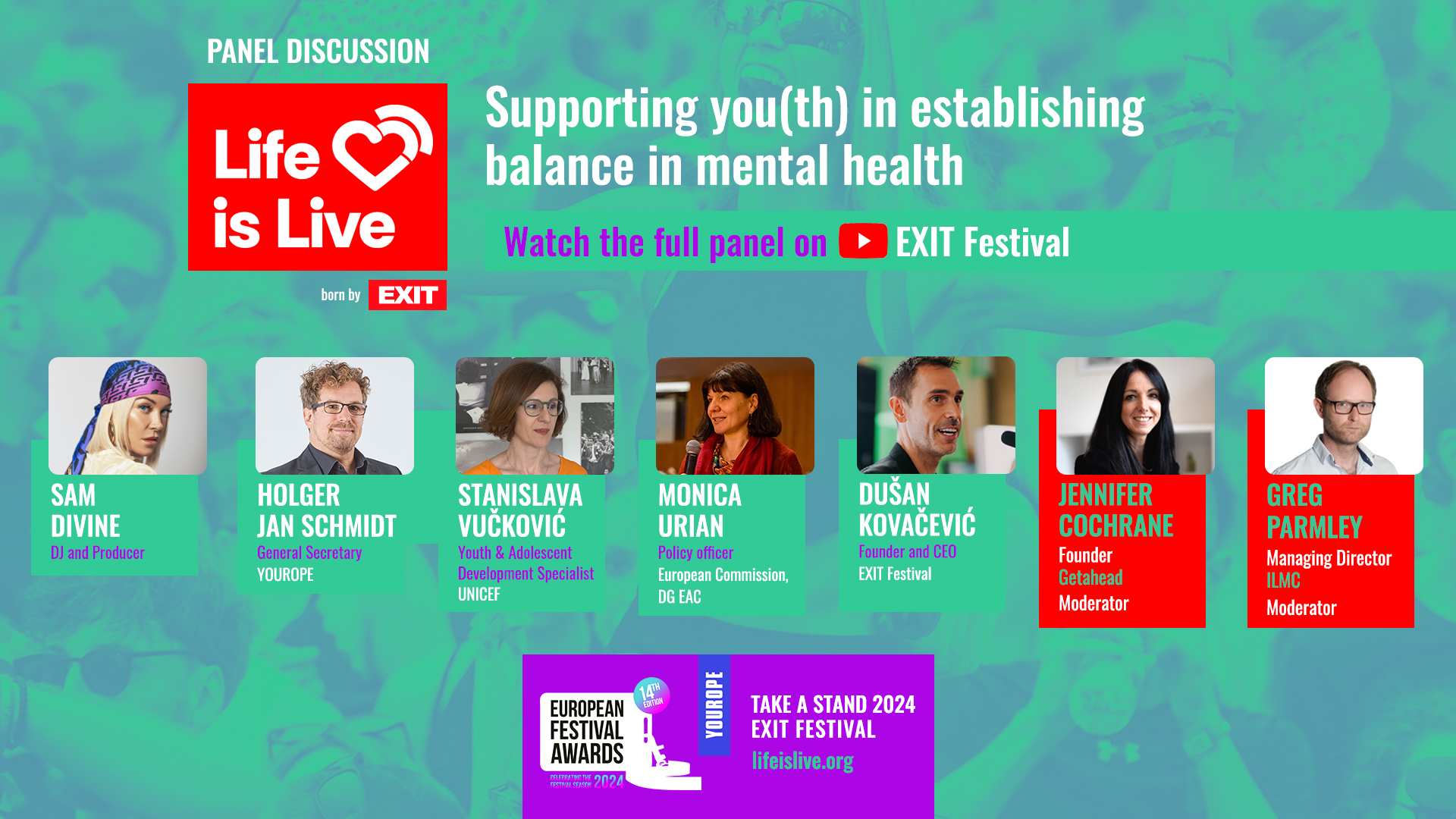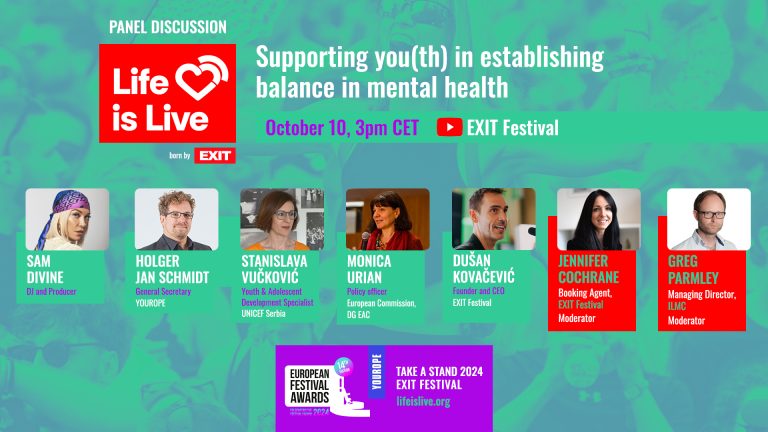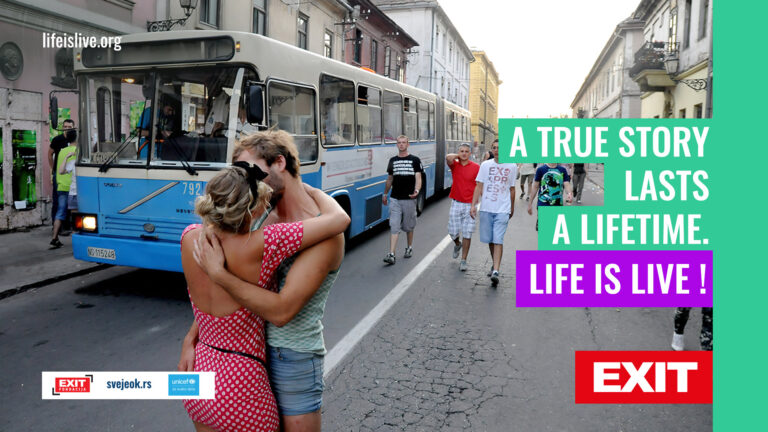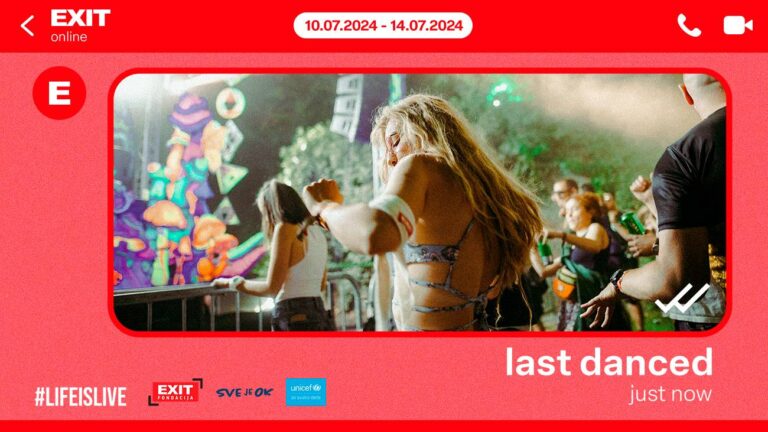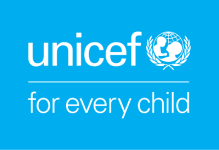On World Mental Health Day, 10 October, EXIT, together with UNICEF and YOUROPE, Europe’s umbrella festival association, hosted the international panel “Life is Live: Supporting You(th) in Establishing Balance in Mental Health,“ dedicated to the role of music and culture in safeguarding the mental health of young people.
A special focus was placed on the problem of digital addiction among youth, which has now surpassed all other forms of addiction combined. Through open discussion, participants highlighted World Health Organization evidence showing that taking part in arts and culture significantly benefits health, especially mental health, and emphasized the crucial role festivals and culture play in prevention and youth empowerment.
Speakers included Monica Urian, Policy Officer at the European Commission’s Directorate-General for Education, Youth, Sport and Culture, Stanislava Vučković, Youth & Adolescent Development Specialist at UNICEF Serbia, renowned British DJ and producer Sam Divine, Holger Jan Schmidt, Secretary General of YOUROPE, and Dušan Kovačević, founder and director of the EXIT Festival. The discussion was moderated by Greg Parmley, founder of the ILMC music conference and IQ Magazine, and Jennifer Cochrane, founder of Getahead, an organization devoted to mental health and well-being.
The panelists agreed that festivals carry social responsibility and real therapeutic potential, that culture and music are public-health resources which connect, heal, and empower, and that it is vital to launch global initiatives that can be applied locally.
Sharing findings from recent research, UNICEF’s Stanislava Vučković noted that since the COVID-19 pandemic, anxiety and depression among young people have risen by 20%, while suicide has become the second leading cause of death in this population. She drew attention to mounting social pressures online, especially among girls, and stressed that UNICEF in Serbia has, since 2021, consistently highlighted how many young people struggle with self-image and self-awareness. She underscored festivals as a powerful platform for promoting positive coping strategies and human connection.
Monica Urian, a cultural policy expert at the European Commission, emphasized that we are living in an exceptionally opportune moment to connect the fields of culture and health. As she noted, she has worked in cultural policy since 2007, and only now, for the first time, does she see health being seriously viewed through a cultural lens. She cited World Health Organization evidence confirming that participation in the arts and culture significantly contributes to mental health, and stressed that the time has come to translate those findings into concrete policies, funding, and cross-sector cooperation.
In her presentation, she outlined successfully implemented European Commission projects and showed how certain countries are applying “culture prescription models” and music programs, from intensive care units in Aarhus and the university course “Medicine, Music & Mind“ in Portugal, to numerous good practices in Spain and France, where the ministries of culture and health have cooperated in a formal capacity for years. “Cultural participation is a health behaviour. So an investment in cultural participation is an investment in health,“ she noted.
Sam Divine shared her personal experience with burnout, the pressures of the scene, and sobriety, stressing that the industry must offer real, healthy alternatives and normalize “sober” choices. “I’m nine months clean and sober now. That has brought so much clarity, peace, and a renewed focus on well-being,” she said, calling for the path to help to be made more visible and accessible to both artists and audiences, and adding that “it is essential to provide support to artists, to normalize this topic, and to show young talents that health and art can go hand in hand.”
Dušan Kovačević built on Sam Divine’s remarks and underscored the importance of joint action to safeguard the mental health of artists and festival-goers. He proposed introducing the concept of a “sober rider” as a standard for supporting a healthy artistic environment and communicating it through relevant institutions and festival platforms.
He recalled the motives behind EXIT’s Life is Live“ campaign, namely, the need to restore the experience of real-life encounters in the face of digital addiction. “For so many people, it’s more important to have a video from the event than to have an experience from the event, and that is tragic. It is like a pandemic,” Kovačević said, adding that EXIT felt the need to understand, address, and act on this, which UNICEF recognized, joining the project from the very beginning, and Europe’s umbrella festival organization YOUROPE honoured with the prestigious Take a Stand Award.
Continuing on this topic, Holger Jan Schmidt noted that festivals and the music industry are not just the stage and the audience, but above all, the people who create them. In his presentation, he emphasized that YOUROPE, through the 3F – Future-Fit Festivals project, is working to establish standards on health and safety, digitalization, diversity and equity, inclusion, and well-being across all areas of the festival industry. He also reminded everyone that festivals stand for the values of openness, community, and peaceful dialogue, and that these principles are under pressure today – making the preservation of an authentic live experience more important than ever, adding: “You can’t have the video without the experience.“
After all the panelists’ remarks, Jennifer Cochrane called on everyone to continue breaking down stigma, building support networks, and using available resources, including EXIT’s Life is Live project, while Greg Parmley concluded that it is necessary to keep the dialogue alive throughout the year and to forge stronger partnerships between industries, institutions, and policymakers, underscoring that “music can do more than entertain – it heals, connects and inspires.”
